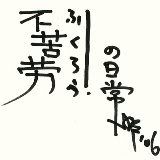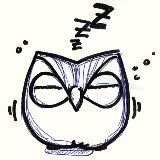- study time: kwaidan 1 -
currently listening to - Returner ~Yami no Shuuen~ (Gackt)
mood - ahh.. how can i live without air-con room..
had Nihon Jijou today. i like this subject, partly because it's not much of a "threat" (i.e. free credits, if you attend classes properly).. and i had the chance to really learn something about japanese history.
during the last few lessons we focused on Koizumi Yakumo and Natsume Souseki. Koizumi Yakumo, or Lafcadio Hearn, was the first foreigner who naturalized himself as a Japanese (and that's why he has a japanese name). as a novelist and researcher, he was the one who compiled several ghost stories which he heard from his japanese wife, and wrote the famous "Kwaidan". i've not read all of the stories, but i know "Mujina" and "Yuki-onna" are quite famous.
"Mujina" is an old Japanese term referring to the badger, and sometimes the raccoon dog (also known as tanuki) or the civet. in Japanese folklores, this creature is said to know how to transform and trick human-beings, just like the fox and the tanuki. and one of their special techniques is to turn into faceless ghosts...
*****
The last person who saw the mujina was an old merchant who lived near Kyobashi, and it's been 30 years since he died. This is exactly how he told the story..
One day, late at night, as he rushed up the Kinokuni-zaka, he saw a lady squatting down by the lakeside, weeping silently. He was worried that she might throw herself into the lake, and he would do anything he could to help her and console her. He stopped. The lady was slender and finely dressed. And her hair was tied up like that of someone from a good family.
"Hello, young lady," he said while he approached her, "You shouldn't be crying like that! ... Would you please tell me what are your troubles? I'd like to help you if there's anything I can do for you," (he was a kind man, so he actually meant it).
But the lady kept crying - while hiding her face with one side of her long kimono sleeves.
"Young lady," he said again, with a gentle voice, "Now, if you'd please listen.. This is not the kind of place a young lady such as you should come in the middle of the night! Please don't cry! --- Please, tell me, how can I help you?"
The lady stood up slowly, but she was still crying behind her kimono sleeve, her back facing the merchant. He placed his hand on her shoulder quietly, and said with a pleading tone, "Young lady! --- Young lady! --- Young lady! .... Would you please listen? ... Young lady! --- Young lady!"
Then, the "young lady" turned around, lowered her sleeve, and stroke her face with her hand. Suddenly, the merchant realised there was nothing on her face - nothing, no eyes, no nose, not even a mouth!
The merchant gave out a loud cry and ran for his life.
He dashed up the Kinokuni-zaka. It was pitch black and he could not see anything in front. He ran, and ran, and ran - he did not have the courage to look behind.
Finally, from far beyond, the dim light of a lantern came into his sight. He hurried towards it. As he approached the source of the light, he found out that it was only the light from a yonaki-soba hawker. Then again, after experiencing that, any kind of light was bright enough for him. And any kind of person was good enough for him.
He staggered into the stall and cried, "AAAH! ---- AAAAHHHH!! ----- AAAAH!!!"
"Hey, hey!" the soba hawker yelled slovenly, "Hey! What happened? Were you slashed by someone?"
"No --- No one would slash me," the merchant was out of breath, "It's just .... AAAH! --- AAAAAHHH!!"
"You were just threatened?" guessed the hawker coldly, "By the oihagi?"
"Not the oihagi --- not the oihagi!" he was scared out of his wits, "She was there... A lady was there --- by the lakeside...... And, she showed me..... AAAHH! What she showed me, I just can't explain!!!!!"
"Oh, you can't? The thing that she showed you.. Isn't it something like this?" said the hawker, and he stroke his face with his hand - and his face, too, turned into an egg-like thing. Without eyes, nose and mouth.
And then, the lights went out.
*****
yeap, this is how it goes. tried translating it directly from Yakumo's "Mujina".. so some parts sound really japanese im sorry...
apparently there's a "modern version" for this mujina story too, but i don't think i've read it before. i do know that this mujina thing came out in one of the famous Ghibli anime, "Pompoko". it's actually a story about raccoon dogs, but in the anime, these mischievous animals tried to threaten (??) humans by using the "faceless ghost" trick.
(to be continued..)
*****
1) Nihon Jijou - usually referred to as Japanese Culture, but i think it's more than that (like history, current issues..)
2) Kwaidan : 怪談(くわいだん)。now in modern japanese, it's pronounced as "kaidan".
3) Kyobashi (京橋) - a place between Ginza and Nihonbashi. yeah the tokyo one, not the osaka one...
4) Kinokuni-zaka (紀国坂) - a slope named Kinokuni which is in Akasaka. note: same kanji as the bookstore kinokuniya =D
5) yonaki-soba (夜泣きそば) - soba (hawker) that runs at night.
6) oihagi (追剥) - highwayman/thief.
mood - ahh.. how can i live without air-con room..
had Nihon Jijou today. i like this subject, partly because it's not much of a "threat" (i.e. free credits, if you attend classes properly).. and i had the chance to really learn something about japanese history.
during the last few lessons we focused on Koizumi Yakumo and Natsume Souseki. Koizumi Yakumo, or Lafcadio Hearn, was the first foreigner who naturalized himself as a Japanese (and that's why he has a japanese name). as a novelist and researcher, he was the one who compiled several ghost stories which he heard from his japanese wife, and wrote the famous "Kwaidan". i've not read all of the stories, but i know "Mujina" and "Yuki-onna" are quite famous.
"Mujina" is an old Japanese term referring to the badger, and sometimes the raccoon dog (also known as tanuki) or the civet. in Japanese folklores, this creature is said to know how to transform and trick human-beings, just like the fox and the tanuki. and one of their special techniques is to turn into faceless ghosts...
*****
The last person who saw the mujina was an old merchant who lived near Kyobashi, and it's been 30 years since he died. This is exactly how he told the story..
One day, late at night, as he rushed up the Kinokuni-zaka, he saw a lady squatting down by the lakeside, weeping silently. He was worried that she might throw herself into the lake, and he would do anything he could to help her and console her. He stopped. The lady was slender and finely dressed. And her hair was tied up like that of someone from a good family.
"Hello, young lady," he said while he approached her, "You shouldn't be crying like that! ... Would you please tell me what are your troubles? I'd like to help you if there's anything I can do for you," (he was a kind man, so he actually meant it).
But the lady kept crying - while hiding her face with one side of her long kimono sleeves.
"Young lady," he said again, with a gentle voice, "Now, if you'd please listen.. This is not the kind of place a young lady such as you should come in the middle of the night! Please don't cry! --- Please, tell me, how can I help you?"
The lady stood up slowly, but she was still crying behind her kimono sleeve, her back facing the merchant. He placed his hand on her shoulder quietly, and said with a pleading tone, "Young lady! --- Young lady! --- Young lady! .... Would you please listen? ... Young lady! --- Young lady!"
Then, the "young lady" turned around, lowered her sleeve, and stroke her face with her hand. Suddenly, the merchant realised there was nothing on her face - nothing, no eyes, no nose, not even a mouth!
The merchant gave out a loud cry and ran for his life.
He dashed up the Kinokuni-zaka. It was pitch black and he could not see anything in front. He ran, and ran, and ran - he did not have the courage to look behind.
Finally, from far beyond, the dim light of a lantern came into his sight. He hurried towards it. As he approached the source of the light, he found out that it was only the light from a yonaki-soba hawker. Then again, after experiencing that, any kind of light was bright enough for him. And any kind of person was good enough for him.
He staggered into the stall and cried, "AAAH! ---- AAAAHHHH!! ----- AAAAH!!!"
"Hey, hey!" the soba hawker yelled slovenly, "Hey! What happened? Were you slashed by someone?"
"No --- No one would slash me," the merchant was out of breath, "It's just .... AAAH! --- AAAAAHHH!!"
"You were just threatened?" guessed the hawker coldly, "By the oihagi?"
"Not the oihagi --- not the oihagi!" he was scared out of his wits, "She was there... A lady was there --- by the lakeside...... And, she showed me..... AAAHH! What she showed me, I just can't explain!!!!!"
"Oh, you can't? The thing that she showed you.. Isn't it something like this?" said the hawker, and he stroke his face with his hand - and his face, too, turned into an egg-like thing. Without eyes, nose and mouth.
And then, the lights went out.
*****
yeap, this is how it goes. tried translating it directly from Yakumo's "Mujina".. so some parts sound really japanese im sorry...
apparently there's a "modern version" for this mujina story too, but i don't think i've read it before. i do know that this mujina thing came out in one of the famous Ghibli anime, "Pompoko". it's actually a story about raccoon dogs, but in the anime, these mischievous animals tried to threaten (??) humans by using the "faceless ghost" trick.
(to be continued..)
*****
1) Nihon Jijou - usually referred to as Japanese Culture, but i think it's more than that (like history, current issues..)
2) Kwaidan : 怪談(くわいだん)。now in modern japanese, it's pronounced as "kaidan".
3) Kyobashi (京橋) - a place between Ginza and Nihonbashi. yeah the tokyo one, not the osaka one...
4) Kinokuni-zaka (紀国坂) - a slope named Kinokuni which is in Akasaka. note: same kanji as the bookstore kinokuniya =D
5) yonaki-soba (夜泣きそば) - soba (hawker) that runs at night.
6) oihagi (追剥) - highwayman/thief.






0 Comments:
Post a Comment
<< Home